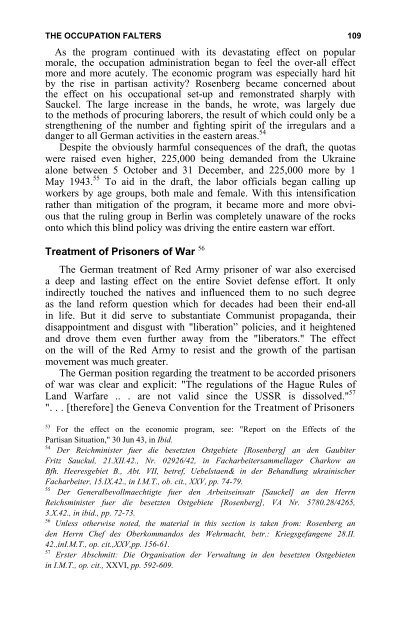the soviet partisan movement 1941-1944 by edgar m. howell
the soviet partisan movement 1941-1944 by edgar m. howell
the soviet partisan movement 1941-1944 by edgar m. howell
Create successful ePaper yourself
Turn your PDF publications into a flip-book with our unique Google optimized e-Paper software.
THE OCCUPATION FALTERS 109<br />
As <strong>the</strong> program continued with its devastating effect on popular<br />
morale, <strong>the</strong> occupation administration began to feel <strong>the</strong> over-all effect<br />
more and more acutely. The economic program was especially hard hit<br />
<strong>by</strong> <strong>the</strong> rise in <strong>partisan</strong> activity? Rosenberg became concerned about<br />
<strong>the</strong> effect on his occupational set-up and remonstrated sharply with<br />
Sauckel. The large increase in <strong>the</strong> bands, he wrote, was largely due<br />
to <strong>the</strong> methods of procuring laborers, <strong>the</strong> result of which could only be a<br />
streng<strong>the</strong>ning of <strong>the</strong> number and fighting spirit of <strong>the</strong> irregulars and a<br />
danger to all German activities in <strong>the</strong> eastern areas. 54<br />
Despite <strong>the</strong> obviously harmful consequences of <strong>the</strong> draft, <strong>the</strong> quotas<br />
were raised even higher, 225,000 being demanded from <strong>the</strong> Ukraine<br />
alone between 5 October and 31 December, and 225,000 more <strong>by</strong> 1<br />
May 1943. 55 To aid in <strong>the</strong> draft, <strong>the</strong> labor officials began calling up<br />
workers <strong>by</strong> age groups, both male and female. With this intensification<br />
ra<strong>the</strong>r than mitigation of <strong>the</strong> program, it became more and more obvious<br />
that <strong>the</strong> ruling group in Berlin was completely unaware of <strong>the</strong> rocks<br />
onto which this blind policy was driving <strong>the</strong> entire eastern war effort.<br />
Treatment of Prisoners of War 56<br />
The German treatment of Red Army prisoner of war also exercised<br />
a deep and lasting effect on <strong>the</strong> entire Soviet defense effort. It only<br />
indirectly touched <strong>the</strong> natives and influenced <strong>the</strong>m to no such degree<br />
as <strong>the</strong> land reform question which for decades had been <strong>the</strong>ir end-all<br />
in life. But it did serve to substantiate Communist propaganda, <strong>the</strong>ir<br />
disappointment and disgust with "liberation” policies, and it heightened<br />
and drove <strong>the</strong>m even fur<strong>the</strong>r away from <strong>the</strong> "liberators." The effect<br />
on <strong>the</strong> will of <strong>the</strong> Red Army to resist and <strong>the</strong> growth of <strong>the</strong> <strong>partisan</strong><br />
<strong>movement</strong> was much greater.<br />
The German position regarding <strong>the</strong> treatment to be accorded prisoners<br />
of war was clear and explicit: "The regulations of <strong>the</strong> Hague Rules of<br />
Land Warfare .. . are not valid since <strong>the</strong> USSR is dissolved." 57<br />
". . . [<strong>the</strong>refore] <strong>the</strong> Geneva Convention for <strong>the</strong> Treatment of Prisoners<br />
53<br />
For <strong>the</strong> effect on <strong>the</strong> economic program, see: "Report on <strong>the</strong> Effects of <strong>the</strong> <br />
Partisan Situation," 30 Jun 43, in Ibid.<br />
54<br />
Der Reichminister fuer die besetzten Ostgebiete [Rosenberg] an den Gaubiter<br />
Fritz Sauckul, 21.XII.42., Nr. 02926/42, in Facharbeitersammellager Charkow an<br />
Bfh. Heeresgebiet B., Abt. VII, betref, Uebelstaen& in der Behandlung ukrainischer <br />
Facharbeiter, 15.IX.42., in I.M.T., ob. cit., XXV, pp. 74-79.<br />
55<br />
Der Generalbevollmaechtigte fuer den Arbeitseinsatr [Sauckel] an den Herrn <br />
Reichsminister fuer die besetzten Ostgebiete [Rosenberg], VA Nr. 5780.28/4265,<br />
3.X.42., in ibid., pp. 72-73.<br />
56<br />
Unless o<strong>the</strong>rwise noted, <strong>the</strong> material in this section is taken from: Rosenberg an<br />
den Herrn Chef des Oberkommandos des Wehrmacht, betr.: Kriegsgefangene 28.II.<br />
42.,inI.M.T., op. cit.,XXV,pp. 156-61.<br />
57 Erster Abschmitt: Die Organisation der Verwaltung in den besetzten Ostgebieten<br />
in I.M.T., op. cit., XXVI, pp. 592-609.
















